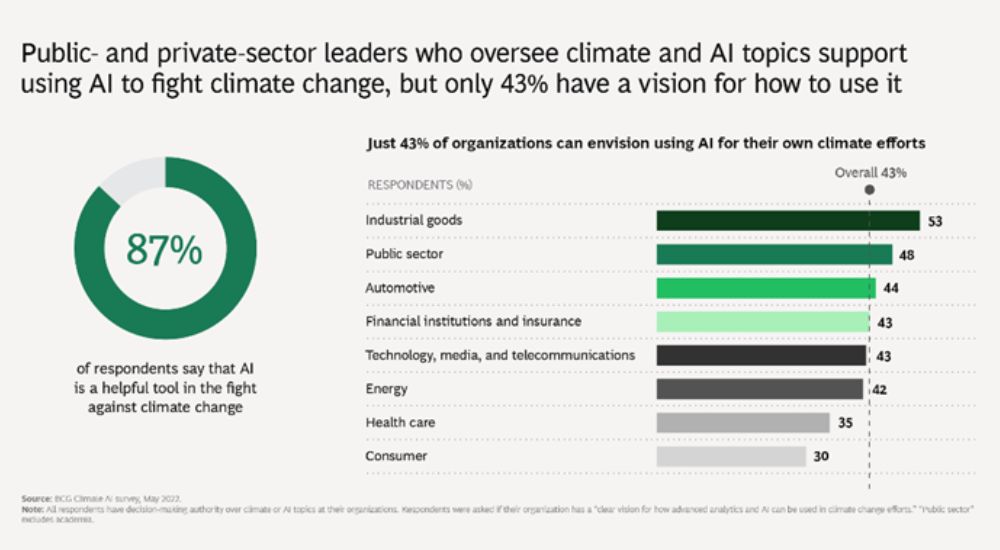67% executives lack confidence in AI-related analysis as obstacle in climate change says BCG report

Climate change will have significant impacts on environmental, social, political, and economic systems around the world. Climate change mitigation, along with adaptation and resilience, is therefore crucial. Efforts to achieve net-zero emissions by 2050 will be essential, as will efforts to prepare for the consequences of climate change and to minimise the resulting harm. Applying advanced analytics and artificial intelligence to climate challenges provides a vital way to make meaningful change at this critical moment.
Based on survey results from over 1,000 executives with decision-making authority on artificial intelligence or climate-change initiatives, the report finds that roughly 40% of organisations can envision using artificial intelligence for their own climate efforts. However, even among these experts, there is widespread agreement that significant barriers to broad adoption remain in place: 78% of respondents cite insufficient artificial intelligence expertise as an obstacle to using artificial intelligence in their climate change efforts, 77% cite limited availability of artificial intelligence solutions as a roadblock, and 67% point to a lack of confidence in artificial intelligence-related data and analysis.
According to the report from the AI for the Planet Alliance, produced in collaboration with Boston Consulting Group and BCG GAMMA, 87% of public- and private-sector leaders who oversee climate and AI topics believe that AI is a valuable asset in the fight against climate change. The report, titled How AI Can Be a Powerful Tool in the Fight Against Climate Change, is being released today.

“Beyond residences and offices using smart meters to monitor and control power usage, every sector, from manufacturing to real estate, can go green with artificial intelligence. Integrating artificial intelligence to track and reduce carbon footprint will enhance overall operations’ efficiency and reduce resource usage, said Elias Baltassis, Partner and Director and BCG GAMMA Lead for the Middle East. The deployment of machine learning models, focused on GHG emissions abatements optimisation, will accelerate initiatives for achieving net-zero emission targets across sectors.”
“There is very significant potential in leveraging digital technologies to reduce emissions. The World Economic Forum estimates that 15% of global emissions can be reduced, and even up to 20% in high-emitting sectors. BCGs own experience shows that using artificial intelligence alone can deliver 5-10% of the required emission reduction—and save costs in the process. This is particularly important in the Middle East where countries have high technology aspirations and are rapidly accelerating climate commitments and actions,” added Simon Birkebaek, Middle East Climate and Sustainability Topic Lead, Partner, BCG.
78% of respondents cite insufficient artificial intelligence expertise as an obstacle
77% cite limited availability of artificial intelligence solutions as a roadblock
67% point to a lack of confidence in artificial intelligence-related data and analysis
Uses of artificial intelligence in Combating Climate Change
Global leaders can use artificial intelligence to achieve their goals in multiple ways:
- One of the most critical uses of artificial intelligence is in the measurement, reduction, and removal of emissions and greenhouse gas effects. More than 60% of public- and private-sector leaders see the greatest business value for their organisations in the reduction and measurement of emissions. According to BCG, use of artificial intelligence can drive reductions of 5% to 10% GHG emissions, or 2.6 to 5.3 gigatons of CO2e if applied globally.
- Adaptation and Resilience. Adapting to climate change is a critical undertaking for policy makers and the public, as it boosts resilience to the effects of both long-term climate trends and extreme weather events. artificial intelligence is well suited to help project climate-related hazards, whether by improving long-term projections of localised events such as sea-level rise or by upgrading early warning systems for extreme phenomena such as hurricanes or droughts.
- Artificial intelligence can be used to support research and education efforts about climate change, helping stakeholders understand the risks and implications involved and encouraging them to share what they learn. These efforts support and magnify ongoing work toward mitigation and adaptation and resilience.
Need for Meaningful Support
A multitude of critical uses for artificial intelligence exist in the climate change arena, but any successful artificial intelligence solution must be user-friendly and readily accessible. It must offer tangible benefits to the user and provide clear recommendations that are easy to act on. Artificial intelligence solutions therefore need much more meaningful support, including access to capital investment, decision makers, and trained practitioners.
“Artificial intelligence has strong promise to help solve the climate crisis, but artificial intelligence alone is not enough. It depends on the will of decision makers to act and make necessary changes—supported in part by artificial intelligence and other emerging technologies,” said Damien Gromier, Founder of Artificial Intelligence for the Planet and a co-author of the report.
Artificial intelligence for the Planet has invited all interested parties to participate in its call for solutions, with proposals in any stage of maturity and from any sector, whether private, public, academic, or nonprofit. Support for each solution chosen will be tailored to its needs and may range from customised commercial or technical support to investor relationships and network development.






